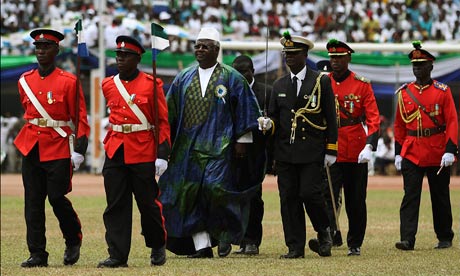
Sierra Leone has just celebrated 50 years of independence. Tony Blair, the former UK prime minister, reflecting on one of his more successful foreign adventures, made a fine speech, rightly congratulating the country on its progress since the dark days of the civil war in the 1990s – two free and fair elections, peaceful regime change, better governance, a rapidly improving economy.
He did not mention the unresolved social tensions that drove the country to war, or the confused aid policies that have arguably served to intensify these tensions. There is a long history to this confusion.
A settlement on the Sierra Leone peninsula was established in 1787 as a home for Black Loyalists who had fought for Britain in the American revolutionary wars. It later became a crown colony and base for the suppression of the Atlantic slave trade. A mixed population of Africans freed from Atlantic slave ships eventually grew to become Freetown's creole community. British forces imposed themselves on the interior at the end of the 19th century to deal with political rivalries disrupting the flow of trade to the coastal colony.
From the outset, the country was shaped by military-backed humanitarian interests – in short, it was an early product of British "ethical foreign policy". The trouble is that those who set the standards for such policy are not much in touch with realities on the ground.
Sierra Leone has suffered – and continues to suffer – from a lack of attention to detail. Nowhere is this more apparent than in the on-off regard for agricultural questions in Sierra Leone. The early humanitarians deplored the plantations growing food for the slave ships in areas adjacent to their infant settlement. They introduced new crops (white rice and cotton) and techniques (the plough) to foster "legitimate" trade.
When cotton and the plough both failed, they shifted attention to other concerns (how to tap natural palm oil from the forests). The failure of later colonial agrarian interventions (schemes to produce rice according to Indian and Burmese models in the aftermath of two world wars) was followed by a shift in emphasis towards investment in Sierra Leone's rich iron ore and diamond deposits. Supposedly, alluvial diamonds were the cause of the recent civil war.
In fact, diamonds attracted international mercenary adventurers, allowing the belligerents to prolong their conflict. The more basic causes of trouble lay in an archaic rural structure that reduced many young people to sweated labour, penury and despair. This interpretation has been resisted by aid officials in charge of a large programme of British-funded post-war social and physical reconstruction.
Instead, they emphasised the rebuilding of a traditional rural social order. This brought a measure of short-term tranquillity to the war-ravaged countryside, the benefits of which are now being reaped by international agribusiness investors.
The issue of what the mass of rural young people do to attain self-realisation remains unresolved. Some youths might yet return to violence, perhaps to fight for land they perceive as lost to international investors.
Neighbouring Liberia presents a different picture. Here, a more enlightened policy has encouraged the agricultural training of ex-combatants. Despite initial scepticism, this programme shows promising results, for example in reducing the numbers of former combatants willing to re-enlist in the war in Ivory Coast.
For the celebration of Sierra Leone at 50 it would have been good to revive the old Blair slogan "education, education, education" but prefaced by the word "agrarian", an adjective still unfashionable in the overseas aid industry.
To consolidate peace, Sierra Leonean youths should now be granted rights to access land for farming equivalent to those enjoyed by international investors.
• Paul Richards is Edward P Bass distinguished visiting fellow at the Yale Institute of Biospheric Studies







